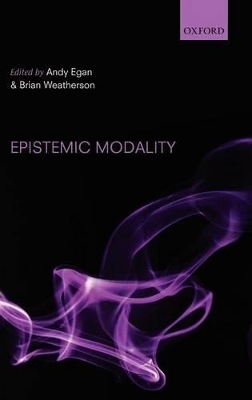
Epistemic Modality
Oxford University Press (Verlag)
978-0-19-959159-6 (ISBN)
There is a lot that we don't know. That means that there are a lot of possibilities that are, epistemically speaking, open. For instance, we don't know whether it rained in Seattle yesterday. So, for us at least, there is an epistemic possibility where it rained in Seattle yesterday, and one where it did not. What are these epistemic possibilities? They do not match up with metaphysical possibilities - there are various cases where something is epistemically possible but not metaphysically possible, and vice versa. How do we understand the semantics of statements of epistemic modality? The ten new essays in this volume explore various answers to these questions, including those offered by contextualism, relativism, and expressivism.
Andy Egan is Associate Professor of Philosophy at Rutgers University in New Brunswick. He grew up in Madison, Wisconsin. He received his BA from the University of Wisconsin at Madison, an MA from the University of Colorado at Boulder, and a PhD from the Massachusetts Institute of Technology. He has held positions at Western Washington University, the Australian National University, and the University of Michigan. Brian Weatherson is an Associate Professor of Philosophy at Rutgers University. He has published on a wide range of topics in philosophy, including decision theory, epistemology, philosophy of language, metaphysics, and aesthetics.
1. Introduction: Epistemic Modals and Epistemic Modality ; 2. Possibilities for Representation and Credence: Two-Space-ism vs. One-Space-ism ; 3. The Nature of Epistemic Space ; 4. Conditional Propositions and Conditional Assertions ; 5. Perspective in Taste Predicates and Epistemic Modals ; 6. 'Might' Made Right ; 7. Perspectives on Possibilities: Contextualism, Relativism, or What? ; 8. Epistemic Modals are Assessment-Sensitive ; 9. Nonfactualism about Epistemic Modals ; 10. How Not to Theorize about the Language of Subjective Uncertainty ; 11. A Problem about Permission and Possibility
| Erscheint lt. Verlag | 23.6.2011 |
|---|---|
| Zusatzinfo | 16 illustrations |
| Verlagsort | Oxford |
| Sprache | englisch |
| Maße | 158 x 236 mm |
| Gewicht | 1038 g |
| Themenwelt | Geisteswissenschaften ► Philosophie ► Erkenntnistheorie / Wissenschaftstheorie |
| Geisteswissenschaften ► Philosophie ► Metaphysik / Ontologie | |
| Geisteswissenschaften ► Philosophie ► Sprachphilosophie | |
| Geisteswissenschaften ► Sprach- / Literaturwissenschaft ► Sprachwissenschaft | |
| ISBN-10 | 0-19-959159-8 / 0199591598 |
| ISBN-13 | 978-0-19-959159-6 / 9780199591596 |
| Zustand | Neuware |
| Informationen gemäß Produktsicherheitsverordnung (GPSR) | |
| Haben Sie eine Frage zum Produkt? |
aus dem Bereich

![Was heißt Denken?. Vorlesung Wintersemester 1951/52. [Was bedeutet das alles?] - Martin Heidegger](/media/113619842)
